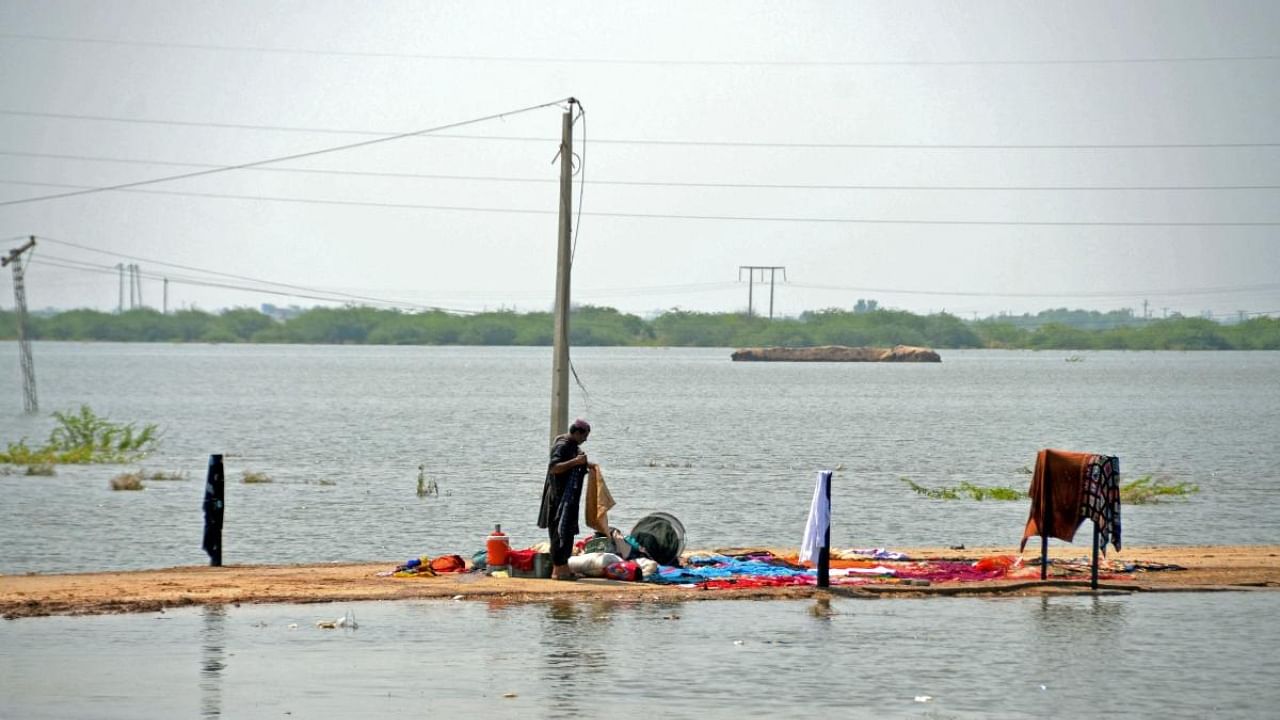
The catastrophic floods that hit Pakistan has caused the country a whopping $28 billion in damages and it might take 2 to 10 years for the long-term construction of the areas affected by the unprecedented calamity, the media reported on Tuesday, quoting a revised estimate.
According to Post Disaster Needs Assessment (PDNA) in the wake of the floods that have killed more than 1,600 dead and left thousands injured since mid-June, Pakistan has seen a 5 per cent upsurge in poverty, indicating that about 9 to 12 million people might fall below the poverty line.
About 1.8 to 2 million jobs have been lost due to the climate-change-induced calamity and average inflation in the cash-strapped country might touch the 23-25 per cent mark in the current fiscal year, the Dawn newspaper cited the government data as saying.
The Planning Commission conceded that the agriculture growth might plunge into negative by -0.7 per cent to -2.1 per cent compared to the envisaged target of positive 3.9 per cent for the current fiscal while exports losses might face a burnt of $3 billion.
Sindh province has suffered the most damages due to the floods, standing at $5.9 billion.
Balochistan province suffered the second most damages, with $3.04 billion in losses.
The PDNA said it might take 2 to 10 years for the long-term construction of the areas affected by the massive natural disaster.
The losses in Punjab province stood at $0.55 billion, in the Khyber Pakhtunkhwa $0.54 billion, in Pakistan occupied Kashmir (POK) $0.02 billion, and Gilgit Baltistan suffered an estimated loss of $0.03 billion, according to the Planning Commission’s chief economist.
During a consultative meeting with renowned economists as well as the representatives of international donors on Monday, the Planning Commission said the total accumulated losses stood at $28 billion instead of the earlier estimated $10.09 billion.
According to the PDNA, federal ministries and divisions face a total loss of $2.9 billion out of the $28 billion, with Pakistan Railways suffering the most -- $2.4 billion damage, the Ministry of Housing and Works suffering a loss of $0.02 billion, National Highway Authority and Pakistan Post Office $0.2 billion, and Ministry of Water Resource $0.29 billion.
Also Read: How climate change is fueling hurricanes
The Flood Protection Plan (IV) requires resources of $4 billion in accordance with its revised estimates.
Total accumulated economic losses stand at $11 billion, and a grand total of damages is close to $28 billion, with major crops such as cotton, rice, maize, and sugarcane largely affected due to the floods that have also displaced more than 33 million persons.
The catastrophic floods have affected one in every seven Pakistanis and damaged roads, railway tracks, highways, agricultural fields, as well as, bridges in the country.
The PDNA, which earlier anticipated growth of 3.7 per cent in livestock, on Monday expected the growth to remain between 2 and 3 per cent, owing to the loss of more than one million large and small animals.
The loss in the agriculture sector is expected to be 3.5-4.5 per cent with agriculture growth remaining negative (0.7 to 2.1 per cent) compared to the 3.9 per cent target.
The loss in the growth of the industrial sector will be 3.5-4 per cent due to its backward linkages with the agriculture sector.
The government estimates said the country would face an overall export loss of about $3 billion during FY23 due to a decline in global demand and lower exports of rice, cotton, fruits, and vegetables.
Import of raw cotton, wheat, and vegetables is expected to increase due to flood losses.
Additionally, lower GDP growth and income level will lead to lower aggregate demand, causing a reduction in the overall import bill, the report said.
The GDP growth for FY23 is expected to be at 1.8-2.3 per cent compared to the annual plan target of 5 per cent, facing an income loss of Rs 2.4 trillion.
Meanwhile, the US government on Monday announced it would offer another $10 million to Pakistan for a food security programme.
US Secretary of State Antony Blinken said 17 planes carrying aid for the flood victims had already left the country, and that the US would send Pakistan an additional $10 million for its food security programme to feed Pakistanis at this crucial time.
Blinken in a meeting with Pakistan Foreign Minister Bilawal Bhutto-Zardari on Monday said he was sending a simple message that “we are here for Pakistan just like we have been in the past”.
The US is leading the international effort to support Pakistan with initial direct assistance of $53 million.